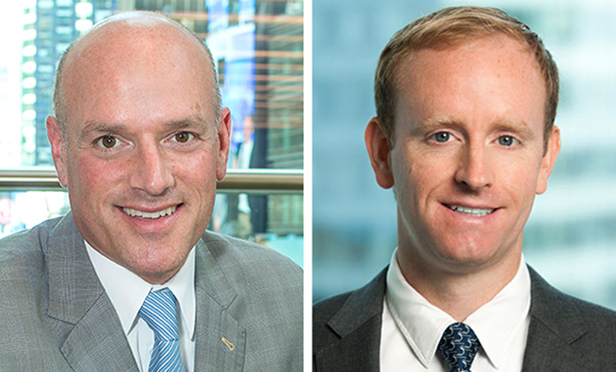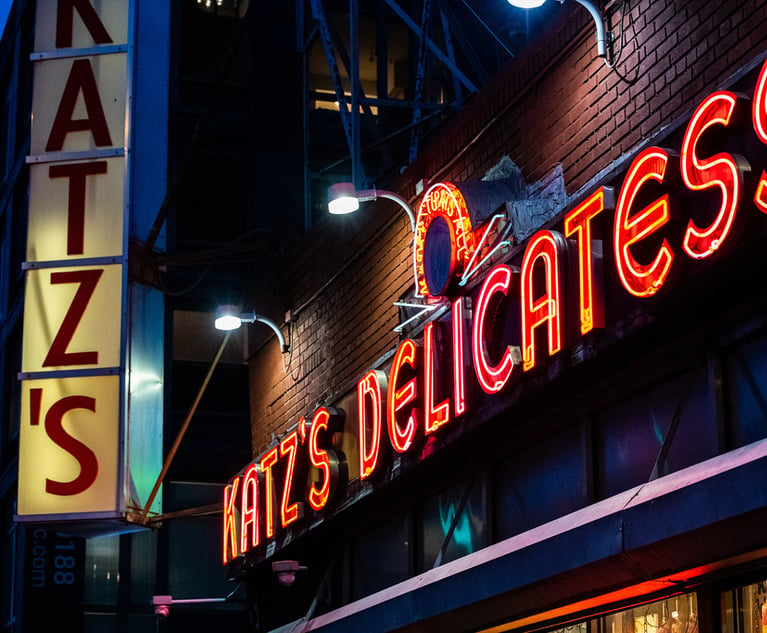Hospitality Industry and Covid 19: Where Do We Go From Here?
In their Hospitality Law column, Todd Soloway and Bryan Mohler discuss the challenges owners, operators, management companies and franchisors must confront in the face (and wake) of the current pandemic.
April 14, 2020 at 01:59 PM
6 minute read
 Todd E. Soloway and Bryan T. Mohler
Todd E. Soloway and Bryan T. Mohler
In reaction to the pandemic, dozens of articles and newsletters have hit the Internet offering advice to all of the participants in the nation's hospitality industry.
Hotel closures; cost cutting; employee severance; WARN Act; withdrawal liability; lender consents; indemnification; force majeure; obligations to fund operations; third party contracts; insurance coverage—each of these issues have been analyzed and negotiated intensely over the past few weeks.
Faced with almost zero occupancy and massive cost structures, hotels are shuttering temporarily as we all weather this horrific crisis; the hope being to re-open at some time in the future when it is safe to travel and stay in hotels. Many other hotels, particularly those that were struggling to make ends meet prior to the pandemic, will never re-open. The herd is being culled as we speak.
Owners, operators, management companies and franchisors of all sizes are in crisis mode as they face diminishing income for unknown period of time. On an emergency market call about three weeks ago, Arne Sorenson, the CEO of Marriott, felt the need to assure the market that Marriott would survive. Others will not. The market capitalization of industry-wide public companies—owners and operators alike—has dropped by as much at 40-50% in the last month alone. And there will be a veritable avalanche of loan defaults. In the last two weeks alone there have been billions of dollars in margin calls for loans secured by hospitality assets.
The sensation is that of the roller-coaster car as it clicks its way up the steep and perilous ramp, approaching the apex after which the wild and unpredictable ride goes into full force and effect. Fasten your seatbelt.
Exacerbating this dire reality—while we are all hopeful that the pandemic will abate in the upcoming months, the end of this industry-wide freefall is difficult, if not impossible to predict. And recession is the likely aftermath.
What's Next
So where do we go from here?
As hotels go into hibernation the first area of contention will be assuring that all associated operating costs are covered. Owners and managers will most certainly disagree on these figures. Owners may not want to fund because it means they will have to come out of pocket while the property is not producing income. They may take the position that a force majeure event has occurred, releasing them from such funding obligations while the hotel is closed. But at the end of the day, they will have little choice. If an owner has material equity in the property—equity they want to protect, then in order to re-open at some time in the future, they will be left with little choice but to pay the costs associated with carrying the property during the period of the shutdown (and re-opening).
Included in this set of carry costs associated with temporary closings is union employee severance—which has been the subject of a great deal of industry attention. At least in the New York area, the industry wide bargaining agreement did not provide for payment of temporary severance. In an emergency arbitration, it was ruled that the union employees were entitled to health coverage for four months, but that the employees were not entitled to be paid during the temporary layoff.
What constitutes "temporary" may soon become the subject of additional disputes as the crisis begins to wane. When "temporary" becomes "permanent" may subject owners and operators to significant liability for severance. The unions will most certainly be aggressive in protecting their constituents. The issue of withdrawal liability under Federal ERISA law will also need to be closely examined in this context.
Another prong of the temporary closure negotiation will involve the lenders. Owners will want to deploy FF&E reserves—which are likely to sit dormant for the foreseeable future—for alternative uses including to fund debt service. Brands are looking to the future when the Covid-19 crisis is behind us (hopefully) and are concerned that reserve funds will not be there to upgrade or maintain their brand standards.
While most contracts provide that the FF&E reserve is controlled by the operator, it is collateral for the lender and the brands do have to concede one point: it is not their money. The market for these temporary closure deals thus far is providing for the use of reserve funds for operating expenses, but not debt service. That may change, and in all events is likely dependent on the lender cooperating.
The race for loan renegotiation is now underway as well. As owners face the prospect of an extended revenue downturn in even the best scenarios—particularly for convention hotels reliant on large groups gathering in one location, unthinkable during this pandemic—they are looking at every angle to reduce carrying costs.
Owners are jockeying to make sure that their loan terms do not become above-market as their competitors seek more friendly terms from their respective lenders. Lenders, likely none too eager to foreclose and become hotel owners in this environment, will be forced to make difficult decisions. All of this is playing out real-time in the midst of a global economic crisis with no clear end in sight.
Which brings us to the logical next big issue: When does the hotel re-open?
This is sure to be a point of intense contention. Managers and franchisors count on the hotel being open and operating in order to collect their fees. In fact, most contracts require the hotel to be in continuous operation. But when? And who makes that determination? Under most standard hotel management agreements, owners delegate significant decision-making authority to the manager/operator but those decisions are generally subject to standards set forth in the contract. We can all recognize that re-opening will not be synonymous with profitability. In fact, most hotels will not achieve profitability for a substantial period of time after re-opening. That begs a few rhetorical questions: Is an owner required to open even while losing money in the short term? Can the manager/operator dictate the re-opening? And once again, how will they settle upon the necessary operating expenditures and reserves in order to operate once the property re-opens? These issues will most certainly lead to disputes; deals and lender workouts across the hospitality industry. And we have not even discussed the hotels that will never re-open.
All that is certain is that industry stakeholders will face unprecedented challenges and opportunities in the coming weeks and months. Hold on to your hats…
Todd E. Soloway leads the Hotel and Hospitality Group at Pryor Cashman and co-heads the firm's litigation practice. Bryan T. Mohler is a partner in the firm's Hotel and Hospitality and Litigation Groups. Itai Raz, an associate in the firm's litigation group, assisted in the preparation of the article.
This content has been archived. It is available through our partners, LexisNexis® and Bloomberg Law.
To view this content, please continue to their sites.
Not a Lexis Subscriber?
Subscribe Now
Not a Bloomberg Law Subscriber?
Subscribe Now
NOT FOR REPRINT
© 2025 ALM Global, LLC, All Rights Reserved. Request academic re-use from www.copyright.com. All other uses, submit a request to [email protected]. For more information visit Asset & Logo Licensing.
You Might Like
View All
Here’s Looking at You, Starwood: A Piercing the Corporate Veil Story?
7 minute read
NYC’s Oldest Deli Agrees to Update Bathrooms, Entrances to End ADA Charges
4 minute read

Law Firms Mentioned
Trending Stories
- 1Litigators of the Week: A $630M Antitrust Settlement for Automotive Software Vendors—$140M More Than Alleged Overcharges
- 2Litigator of the Week Runners-Up and Shout-Outs
- 3Linklaters Hires Four Partners From Patterson Belknap
- 4Law Firms Expand Scope of Immigration Expertise, Amid Blitz of Trump Orders
- 5Latest Boutique Combination in Florida Continues Am Law 200 Merger Activity
Who Got The Work
J. Brugh Lower of Gibbons has entered an appearance for industrial equipment supplier Devco Corporation in a pending trademark infringement lawsuit. The suit, accusing the defendant of selling knock-off Graco products, was filed Dec. 18 in New Jersey District Court by Rivkin Radler on behalf of Graco Inc. and Graco Minnesota. The case, assigned to U.S. District Judge Zahid N. Quraishi, is 3:24-cv-11294, Graco Inc. et al v. Devco Corporation.
Who Got The Work
Rebecca Maller-Stein and Kent A. Yalowitz of Arnold & Porter Kaye Scholer have entered their appearances for Hanaco Venture Capital and its executives, Lior Prosor and David Frankel, in a pending securities lawsuit. The action, filed on Dec. 24 in New York Southern District Court by Zell, Aron & Co. on behalf of Goldeneye Advisors, accuses the defendants of negligently and fraudulently managing the plaintiff's $1 million investment. The case, assigned to U.S. District Judge Vernon S. Broderick, is 1:24-cv-09918, Goldeneye Advisors, LLC v. Hanaco Venture Capital, Ltd. et al.
Who Got The Work
Attorneys from A&O Shearman has stepped in as defense counsel for Toronto-Dominion Bank and other defendants in a pending securities class action. The suit, filed Dec. 11 in New York Southern District Court by Bleichmar Fonti & Auld, accuses the defendants of concealing the bank's 'pervasive' deficiencies in regards to its compliance with the Bank Secrecy Act and the quality of its anti-money laundering controls. The case, assigned to U.S. District Judge Arun Subramanian, is 1:24-cv-09445, Gonzalez v. The Toronto-Dominion Bank et al.
Who Got The Work
Crown Castle International, a Pennsylvania company providing shared communications infrastructure, has turned to Luke D. Wolf of Gordon Rees Scully Mansukhani to fend off a pending breach-of-contract lawsuit. The court action, filed Nov. 25 in Michigan Eastern District Court by Hooper Hathaway PC on behalf of The Town Residences LLC, accuses Crown Castle of failing to transfer approximately $30,000 in utility payments from T-Mobile in breach of a roof-top lease and assignment agreement. The case, assigned to U.S. District Judge Susan K. Declercq, is 2:24-cv-13131, The Town Residences LLC v. T-Mobile US, Inc. et al.
Who Got The Work
Wilfred P. Coronato and Daniel M. Schwartz of McCarter & English have stepped in as defense counsel to Electrolux Home Products Inc. in a pending product liability lawsuit. The court action, filed Nov. 26 in New York Eastern District Court by Poulos Lopiccolo PC and Nagel Rice LLP on behalf of David Stern, alleges that the defendant's refrigerators’ drawers and shelving repeatedly break and fall apart within months after purchase. The case, assigned to U.S. District Judge Joan M. Azrack, is 2:24-cv-08204, Stern v. Electrolux Home Products, Inc.
Featured Firms
Law Offices of Gary Martin Hays & Associates, P.C.
(470) 294-1674
Law Offices of Mark E. Salomone
(857) 444-6468
Smith & Hassler
(713) 739-1250






